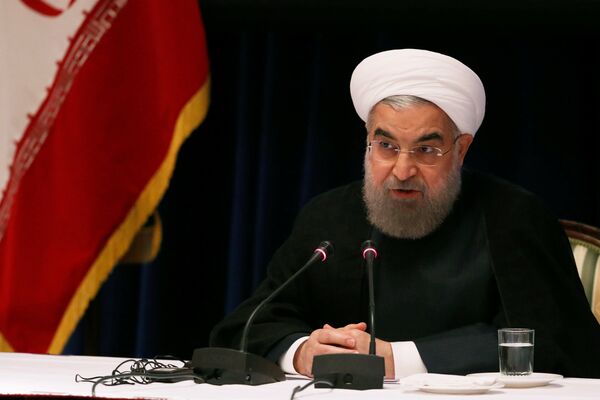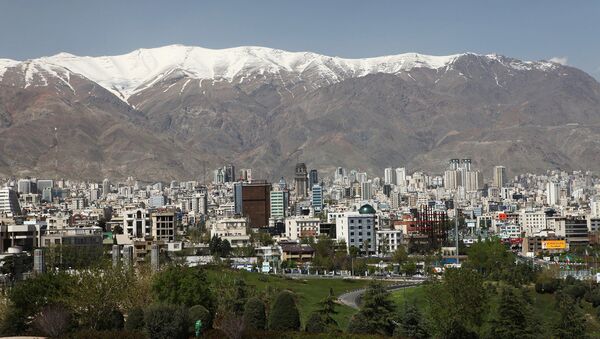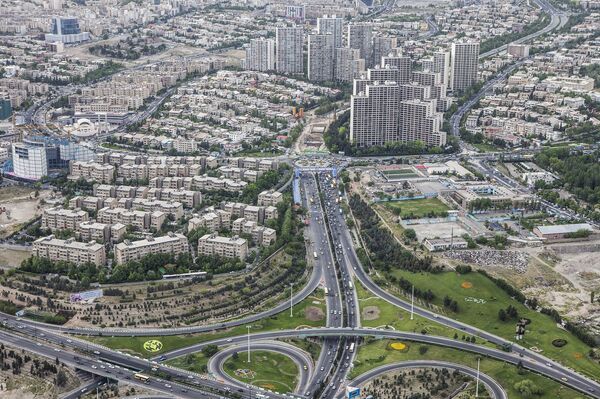"I believe that the only force that can help the region is Russia," Hooshang Amirahmadi, Professor at the US-based Rutgers University and President of American Iranian Council told Radio Sputnik.
"This is honest. Thank God, Russia has fortunately taken a very constructive view on its role in the region, particularly in relation to Iran and the Arab world and in relation to Iran and the West," he added.
"It is very unique and noble because Russia always in the past had wanted Iran to be in conflict with the West and the Arab world. Things have changed. And we should give the credit for it to President Putin," Amirahmadi noted.
The Iranian expert's comments are a follow up to the address of Iranian President Hassan Rouhani at the US General Assembly on Thursday.
In his speech the Iranian leader, among others, accused the US of not complying with the landmark nuclear agreement (the Joint Comprehensive Plan of Action, (JCPOA), commonly known as the Iran deal or Iran nuclear deal) which was reached in Vienna in July 2015 and took effect in January this year.
President Rouhani criticized what he described as an American failure to adhere to obligations under the agreement, which relaxed many economic sanctions on Iran in exchange for pledging to only use nuclear power for peaceful means.
The Iranian leader told reporters that despite the intense diplomacy in reaching the agreement between Iran and the world's powers including the US, there was "not a very stellar report card by the United States when it comes to fulfilling the agreement."
Hooshang Amirahmadi however explained to Sputnik that there are loopholes within the JCPOA agreement which "allow the US to do what it is doing."
"The American primary sanctions are an obstacle to the implementation of the secondary sanctions that have been lifted. The secondary sanctions are the subset and they are linked to the primary sanctions by millions of threads. Therefore due to the very fact that the primary sanctions remain, the secondary sanctions can only have a very limited positive impact for Iran when it comes to lifting them," he said.

The expert however noted that on its part, Iran is not being "very much straightforward and honest on this."
"If the Americans are not really delivering on their commitments as per JCPOA, there is a committee that will hear Iran's complaints," he said.
If this committee can't resolve the problem, Iran has the right to take the issue to the UN Security Council.
"The question is: if they think that the US is not delivering on its commitments why not to take the US to the Security Council?" the expert wondered.
Therefore, he explained, the problem is not that the US is not openly delivering on its commitment but that JCPOA has lots of loopholes.
"The Iranian negotiators were not aware of what they were signing," Amirahmadi noted, adding that he had repeatedly warned that "the Americans are playing a very complicated game with Iran."
At some point, the expert warned, the Iranians will pay for the game the US is playing with them.
"One of those games was exactly this: the JCPOA was written in a way that it created lots of loopholes and it is not really a solid document," he stated.
In his speech President Rouhani also accused Saudi Arabia of hateful ideology across the region.
The Iranian leader was addressing the UN the day after Saudi Crown Prince Mohammed bin Nayef suggested Iran should be a better neighbor in the region and not interfere in the affairs of other countries.
The Iranian President called on Saudi Arabia to "cease and desist" from "divisive policies" if it was serious about regional peace and security.
"If the Saudi government is serious about its vision for development and regional security, it must cease and desist from divisive policies, the spread of hate ideology and trampling upon the rights of neighbors," Rouhani said.
Hooshang Amirahmadi said that while there is no question about the Saudis being guilty of propagating this radical ideology for some time, the two countries have to be honest and balanced in their understanding of history.
"The creation of Daesh, this radical Islam and these movements is the result of many forces, including the American policy, the Israeli policy and the European policy in the region, which was the policy of humiliation of the Arab world and Muslims," the expert told Sputnik.
"The Saudis also propagated radical Islam to counter the Iranian Islamic Revolution of 1979. It is a very complex process," he added.
"With regards to Iran-Saudi relations, both sides are at fault: none of the two is really taking a reasonable approach, they are not talking reasonably to each other," he said.
While the two states "do propagation at the UN," back home the situation is completely different, he said.
"Back home they call each other the worst, the most violent names. Then at the UN they start to moderate that tune," he noted.
This approach is not working, the expert said.
"I think they have to make a decision whether they really want to work with each other or not. And if they do, they have to respect each other's views, religion, ideas, territorial integrity as opposed to intervening in each other's affairs and then come to the UN and make nicer statements," he finally stated.





